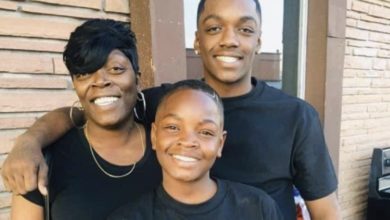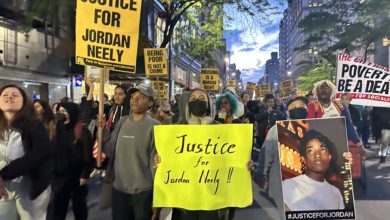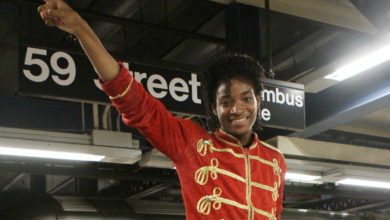In a major victory for the long-imprisoned Angola 3, Albert Woodfox has been granted bail by U.S. District Judge James Brady.
|
“This is a major victory in a case where justice is long overdue. Albert went into Angola in his twenties, and he’s walking out in his 60s. There is no conviction against him now, and the state should not take another day of his life,” said Chris Aberle, Woodfox’s lawyer.
“In 37 years, Albert never gave up hope that someday he would walk out the gates of Angola,” said Nick Trenticosta, also a lawyer in the case. ” We continue to hope that Herman will join him soon. Neither of these men should have spent a day in Angola for this crime.”
Woodfox, along with Herman Wallace, has been imprisoned for 37 years—nearly the entire time in solitary confinement—inside the infamous Louisiana State Prison at Angola. Wallace has a pending appeal with the Supreme Court of Louisiana similar to Woodfox’s. The third member of the Angola 3, Robert King Wilkerson, was released in 2001 after serving 29 years.
In his 1998 retrial, Woodfox was again convicted in a proceeding widely viewed as a travesty of justice. His attorney failed to object to the admission of testimony by witnesses who had died since his original 1972 trial for the killing of prison guard Brent Miller. Woodfox’s lawyer also allowed the prosecutor to testify about the chief prosecution witness’s credibility in the retrial.
Political activists caught in racist frame-up
In 1971, Woodfox and Wallace helped found a chapter of the Black Panther Party inside Angola, the most notorious prison in the United States. A wave of rebellion was engulfing the U.S. prison system at the time—from Attica in New York to San Quentin in California.
Angola penitentiary is a complex of buildings amid huge sugarcane, cotton and soybean fields run on the slave labor of prisoners. Nearly all the prisoners were and are African American.
Angola became the site of the first official prison chapter of the Black Panther Party. The Black Panthers grew rapidly in strength, and attempted to put an end to the extreme corruption and brutality of the “trustee system.” Under this system, selected prisoners were made “trustees,” given favors and guns, and empowered to rule over and exploit the majority of inmates. Rape of young prisoners was rampant. In the dormitories where the Black Panther Party was strong, these practices were stopped. This was viewed as a threat by the authorities.
The all-white prison administration, headed by the notorious Warden Murray Henderson, responded to an upsurge of prisoner activism with extreme repression. In the years that followed, many bodies of murdered prisoners were exhumed from the surrounding swamps.
In April 1972, guard Miller was stabbed to death. Only one person, inmate Hezekiah Brown, witnessed the killing. At first Brown said he could not identify anyone involved because their faces had been covered.
After several days of pressure, however, Brown changed his story and identified four men: Albert Woodfox, Herman Wallace, Gilbert Montegut and Chester Jackson. They became known as the Angola 4.
Montegut, a revolutionary activist like Woodfox and Wallace, was later acquitted. Jackson struck a deal and testified for the prosecution. Years later, evidence emerged that both Hezekiah Brown and Chester Jackson were paid off with sentence reductions and material incentives.
Putting the Black Panther Party on trial
After winning a new trial, Woodfox was indicted anew in 1993. One of the grand jurors was Anne Butler, an author and the wife of Warden Henderson. Butler had written a book, “Dying to Tell,” about Angola prison. The first chapter was on the death of guard Miller, based on the state’s version that Woodfox and Wallace were guilty.
Instead of calling witnesses, the assistant district attorney in charge of presenting the case to the grand jury requested that Butler “explain” the case. The new indictment was then handed up. Judge Bruce Bennett turned down a motion by Woodfox’s lawyers to throw the case out based on outrageous grand juror prejudice.
Woodfox’s 1998 trial was before a classic kangaroo court. As Dr. Gail Shaw, a long-time supporter of the Angola 3, said at the time, “the state’s case was really based on putting the Black Panther Party on trial.”
The prosecution introduced statements from Hezekiah Brown and former warden Henderson, which were allowed into testimony unchallenged by the defense attorneys. In an intimidating show of force on the final day of the trial, prison guards, state police and local sheriffs—all in full-dress uniforms—packed the courtroom, emphasizing to the small-town jury of Amite their expectation of a guilty verdict. Their expectations, predictably, were met.
Outside the Amite courthouse in 1998, Geronimo ji Jaga, who himself had just been released the previous year after spending 27 years in behind bars in California on frame-up charges, testified about the courage of Woodfox and Wallace: “They endured and survived over all these years with very little help from the outside. They are the kind of unsung heroes who we must come forward to help because they never asked for anything from us in exchange for what they have suffered.”
Ten years later, the Angola 3 are still victims of indescribable injustice. What has changed over the past decade is that their case has become internationally known, thanks to a tremendous campaign waged by the Angola 3 Defense Committee and supporters in the United States and around the world.
The overturning of Woodfox’s conviction and his release on bail are victories to be celebrated. Wallace and his supporters are still fighting for justice. The struggle of the Angola 3 will continue until all three men are free.
The author attended the 1998 retrial of Albert Woodfox in Amite, Louisiana. For more information about the struggle of the Angola 3, go to
www.angola3.org.






